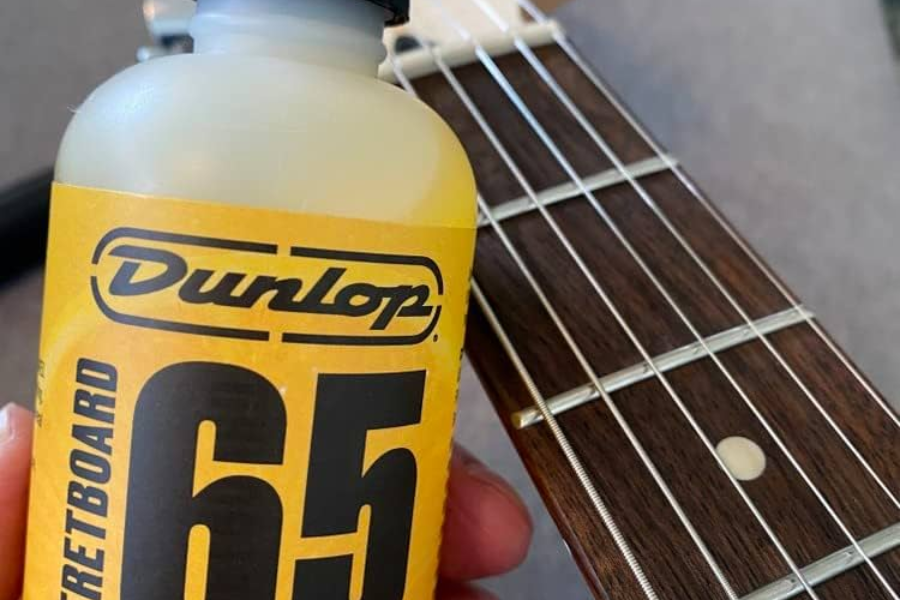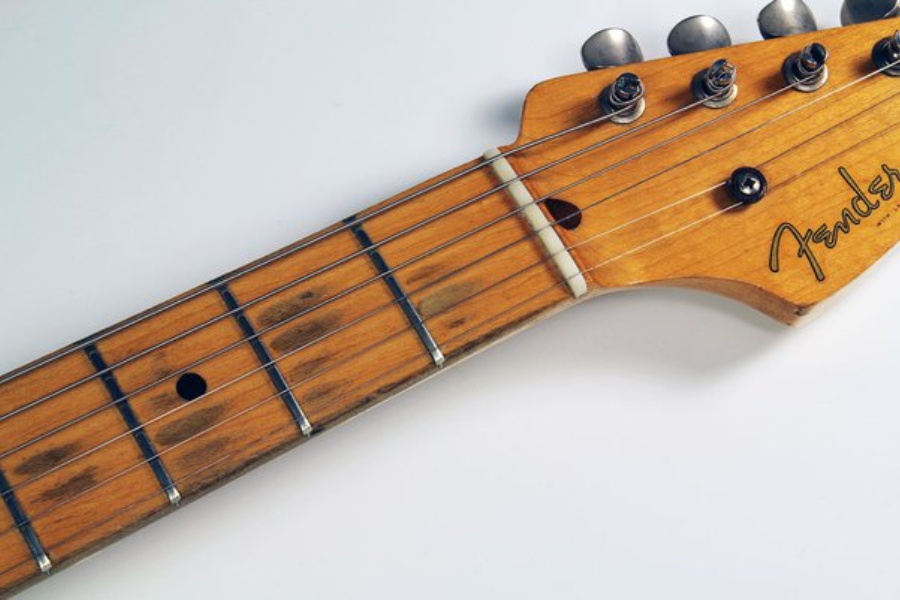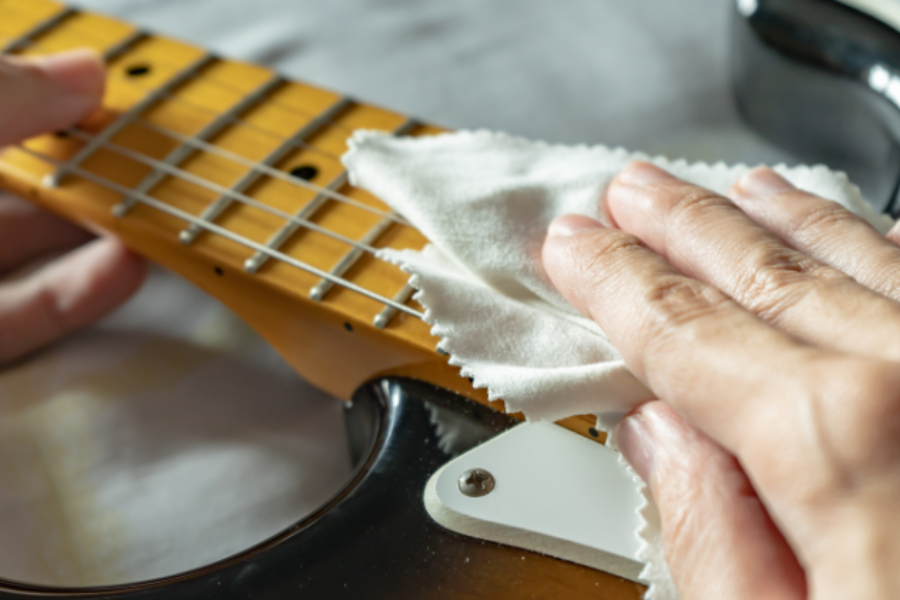
Using lemon oil on your fretboard is a simple, effective way to keep your guitar feeling new and ensure those notes slide smoothly under your fingertips. With just a little care, you can protect your fretboard and enhance your playing experience.
Can we use lemon oil for fretboard ?
Yes, you can use lemon oil on your fretboard, but there’s a bit more to it. Lemon oil is great for cleaning and conditioning the wood, helping to keep it from drying out and cracking. However, it’s essential to use the right type of lemon oil—specifically, a product designed for guitar maintenance, not the stuff you’d find under your kitchen sink.

Fretboards can accumulate grime from playing and changes in humidity. Lemon oil works wonders in removing this buildup without damaging the wood. It also moisturizes the fretboard, keeping the wood supple and preventing wear from frequent playing.
How to use lemon oil for fretboard ?
Lemon oil is fantastic for cleaning and conditioning the wood of your fretboard. It helps remove dirt and grime, keeps the wood from drying out, and maintains its sleek look and feel.
What You Need:
Lemon oil specifically designed for guitar or fretboard use
A soft, clean cloth or two
A guitar (obviously) with a wood fretboard that’s not finished with lacquer or varnish
The correct way to use lemon oil:
How much: You only need a few drops. Seriously, a little goes a long way here.
When: Before you change your strings is an ideal time, or when you notice your fretboard looking a bit tired and dry.
How often: This isn’t a weekly ritual. Aim for every 3 to 6 months, depending on how often you play and the conditions your guitar is kept in.

The Process:
- Remove your strings: It gives you unobstructed access to the entire fretboard.
- Clean the fretboard: Use one soft cloth to gently wipe away any surface dirt or dust.
- Apply lemon oil: Put a few drops of lemon oil on your second clean cloth, not directly on the Fretboard. Gently rub it into the wood, going up and down the fretboard.
- Wipe off excess: After letting it sit for a couple of minutes, use a clean part of your cloth to wipe away any leftover oil. You want it moisturized, not drenched.
A Few No-Nos:
- Don’t use lemon oil on maple fretboards or any other wood with a glossy finish.
- Avoid overdoing it. Too much oil can harm the wood over time.
5 reason for using lemon oil for fretboard of electric guitar
Using lemon oil on your electric guitar’s fretboard isn’t just about maintenance; it’s about enhancing your overall playing experience. It keeps your guitar feeling new, looking great, and playing smoothly. We’re diving into the reasons why lemon oil can be your fretboard’s best friend:
1. Preserves the wood
First things first, lemon oil is fantastic for keeping the wood of your fretboard in top condition. It helps prevent the wood from drying out and cracking, which is crucial for maintaining the health and longevity of your guitar.
2. Cleans deeply
Playing guitar is fun, but it also leaves behind dirt, sweat, and grime on your fretboard. Lemon oil acts as a gentle cleaner, lifting away the gunk without harming the wood, so your guitar looks and feels fresh.
3. Enhances playability
A well-moisturized fretboard isn’t just about aesthetics; it actually makes your guitar easier to play. Those smooth, clean frets allow your fingers to glide effortlessly, making those complex riffs and chords feel easier.
4. Gives a natural shine
Who doesn’t love a guitar that looks as good as it sounds? Lemon oil brings out the natural beauty of your fretboard’s wood, giving it a healthy shine that makes your guitar stand out, whether it’s on stage or on your stand at home.
5. Safe and natural
Choosing lemon oil specifically designed for guitars means you’re applying something safe and natural to your instrument. It’s a gentle way to care for your guitar without introducing harsh chemicals.

Which other oils can I use instead ?
That’s why looking after it, especially the part where your fingers spend most of their time – the fretboard – feels like thanking a good friend. While many of us use lemon oil, I’ve found there are other awesome ways to take care of our fretboards.

Other Great Options for Fretboard Care
- Mineral Oil: This is like a cool drink of water for your fretboard, keeping it feeling good and ready for action.
- Linseed Oil: Think of this as a mini spa day for your guitar. It helps make playing feel super easy and smooth.
- Jojoba Oil: This one’s a lot like the natural stuff that keeps wood healthy, keeping everything feeling real and easy under your fingers.
- Almond Oil: Gentle and sweet, it’s like a little bit of love for your fretboard, helping keep it looking and feeling lively.
- Making It a Special Routine
Taking care of your fretboard is a special time between you and your guitar. It’s how we say thanks for all the tunes. Here’s a simple way to do it:
Start with a clean slate by wiping down the fretboard gently.
Pick your oil and lightly rub it in with a soft cloth, just like caring for something precious.
Wipe away any extra oil, leaving the fretboard ready for more music.
Final thoughts on using lemon oil on fretboard
Our electric guitars are an extension of our creative spirit. The care we give them shows how much we love making music. Whether you’re playing for a crowd or just jamming alone, taking good care of your fretboard means your guitar will always be there for you, ready to bring your music to life.








